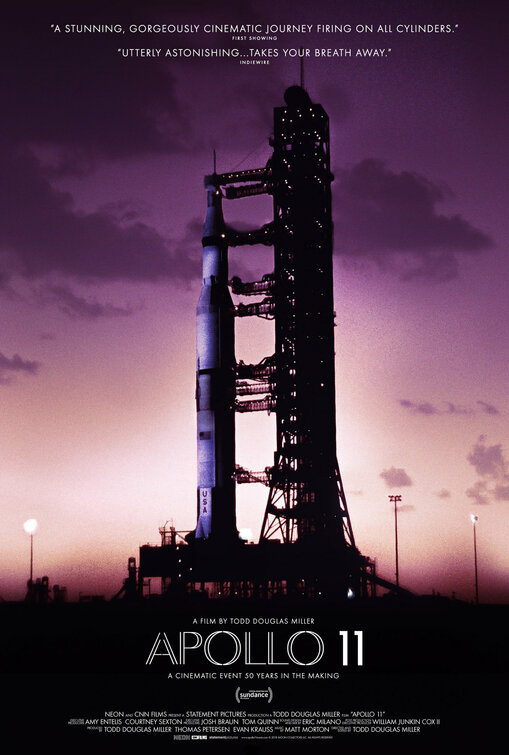
![]() I couldn’t possibly be a bigger Oscar fan. However, I’ll freely admit they often get it wrong. In fact, the Documentary branch of the Academy is guilty of at least one glaring omission every year. It happened in 2017 when Tower failed to garner a nom, then again in 2018 with Jane and Won’t You Be My Neighbor? in 2019. You get the idea. I could’ve selected a title for every year, but then that would become a rant. This is a review — a very positive one at that — for this year’s omission: Apollo 11.
I couldn’t possibly be a bigger Oscar fan. However, I’ll freely admit they often get it wrong. In fact, the Documentary branch of the Academy is guilty of at least one glaring omission every year. It happened in 2017 when Tower failed to garner a nom, then again in 2018 with Jane and Won’t You Be My Neighbor? in 2019. You get the idea. I could’ve selected a title for every year, but then that would become a rant. This is a review — a very positive one at that — for this year’s omission: Apollo 11.
Apollo 11 was, of course, the spaceflight that first landed humans on the Moon. For many Americans, it was a proud occasion they will always remember. However since it took place on July 24, 1969, many moviegoers (including this one) weren’t even alive at the time. This commemorates the 50th Anniversary of the NASA mission. However, you’d think it occurred yesterday given the clarity of this document. Naturally, shots of crowds and people convey hairstyles and fashions that will betray an earlier era. Yet the space footage feels immediate and recent given the quality, power, and detail seen here. It feels ageless, perhaps (dare I say) even futuristic.
Sometimes real life is even better than the movie. The journey to the Moon and back to Earth has been detailed before. There is a myriad of ways that director Todd Douglas Miller could have assembled this chronicle. Contributing to the timelessness is that his presentation contains no voice-over narration or interviews other than the voices of the people in the actual time as it is transpiring. We also have original music composed by Matt Morton. He employs a Moog modular synthesizer to underscore an account that is — in a word — thrilling. Incidentally, every instrument and effect used in the score existed at the time of the mission. There’s something so pure, simple and quite frankly, unique, about a record that doesn’t guide the viewer at all. As a result, the takeaway is largely up to the audience to extract what they want from the images and music presented.
I’ve already mentioned the lack of an Oscar nom for Best Documentary Feature was an unforgivable oversight, but it could have easily warranted one for Best Film Editing as well. Todd Douglas Miller has scrutinized countless hours of footage, many of it heretofore unseen, in a coherent and mesmerizing account. He keeps the editing creative and dynamic. As you’d expect, the Moon landing itself is a highlight. His use of split screens to depict the operation as they prepare to set foot on the surface is brilliantly conceived. The point when the lunar module (LM) separates from the Columbia spacecraft is breathtaking. We get two then three images side by side. The separations and connections of the LM Eagle have never been conveyed with such lucidity as this. If there is a criticism it’s that the narrative is hindered by its inherent non-specificity. A little narration might have helped in constructing what exactly is happening at any given moment. However, that is precisely what makes the document immortal. What it lacks in information, it more than makes up for in poeticism. It looks and sounds amazing. Apollo 11 is a work of art.
03-24-20

3 Responses
Yup. Watched this the other day. Marvellous. I know someone who’s seen it three times and cries each time when the lander touches down.
Sorry. I guess that should have had a spoiler warning.
Haha. No problem,. You’re good! I mean it’s been 51 years. If anyone is unfamiliar with the fact that we successfully lamnded on the moon at this point, then God please bless their soul.